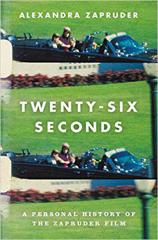Twenty-Six Seconds: A Personal History of the Zapruder Film
Review
Twenty-Six Seconds: A Personal History of the Zapruder Film
The granddaughter of Abraham Zapruder, whose surname has become synonymous with "the film," has drawn together an exhaustively researched account of the facts surrounding the few seconds that changed America, and the many ways that recording them affected her family.
Abraham, a Russian Jewish immigrant, had a comfortable living as a clothing designer in Dallas. Learning that US President John F. Kennedy, a man he greatly admired, was going to be visiting the city, he wanted to be present to watch the motorcade pass by. His wife Lil had to remind him to take along his home movie camera. The film he would take that day would become an instrument of information, presumption, controversy, distress and enduring legacy.
"...an exhaustively researched account of the facts surrounding the few seconds that changed America, and the many ways that recording them affected [Alexandra Zapruder's] family."
The Zapruder film, 26 seconds long, clearly shows the assassination by gunshot of the youthful President as he and his wife rode along in an open limousine. The most complete "home movie" among more than 30 that were taken, it left no doubt that Kennedy had been murdered in the most public possible setting. Shocked, Zapruder rushed home, viewed his film and immediately knew that he was in possession of vital evidence. He resolved to turn it over to the proper authorities; two copies were given to the Secret Service within hours. But after being assailed by demands and offers from various media, and concerned with doing the right thing for himself, his family and his Jewish community that was so often the object of suspicion and prejudice, he sold the clip to LIFE magazine, a widely trusted source, for $150,000, retaining some proprietary rights. LIFE printed multiple frames of the film, only omitting the bloodiest. Until Abraham’s death in 1970, he was forced to relive the events surrounding that film many times in testimony and interviews.
As various troubling theories began to emerge about the events in Dallas, public attention focused on the film. Not being able to view the entire footage because of legal considerations became a thorny issue to conspiracy theorists. The crux was the horrific moment when a second bullet hit the President's head. Many believe that these few seconds of film prove that the shot could not have been fired by Lee Harvey Oswald stationed above and behind the motorcade, as stated by the Warren Commission's official report, but would have come from the front, since the victim's head snaps backwards at impact. Was there a second shooter? A third bullet? Even now, these questions continue to arise.
Alexandra Zapruder recalls knowing about the film as a child, though it was rarely spoken of. After editing a prize-winning collection of Holocaust diaries, SALVAGED PAGES, she decided to tackle this most personal and significant of subjects. She demonstrates through brief but important vignettes that her grandfather was an honorable man trapped, as he believed, "in the wrong place at the wrong time."
It is paradoxical, the author states, that a real piece of film taken of real events should wind up seeming so strangely inconclusive. She skillfully conveys the sense that though it is "messy, complicated, tangled," the film’s symbolic power is her family’s birthright. Painful to view, a reminder of a great personal and national tragedy, the film expresses, Zapruder suggests, "a fundamental human truth that will never grow old and that every generation must grapple with for itself."
Reviewed by Barbara Bamberger Scott on November 18, 2016
Twenty-Six Seconds: A Personal History of the Zapruder Film
- Publication Date: September 12, 2017
- Genres: History, Memoir, Nonfiction
- Paperback: 496 pages
- Publisher: Twelve
- ISBN-10: 1455574821
- ISBN-13: 9781455574827





